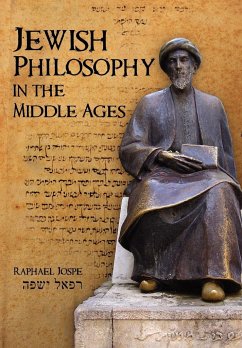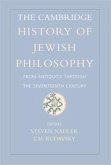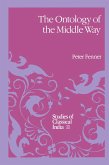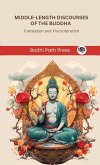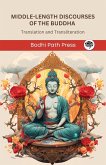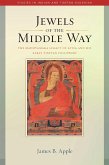Raphael Jospe
Jewish Philosophy in the Middle Ages
Raphael Jospe
Jewish Philosophy in the Middle Ages
- Gebundenes Buch
- Merkliste
- Auf die Merkliste
- Bewerten Bewerten
- Teilen
- Produkt teilen
- Produkterinnerung
- Produkterinnerung
Jewish Philosophy in the Middle Ages presents an overview of the formative period of medieval Jewish philosophy, from its beginnings with Saadiah Gaon to its apex in Maimonides, when Jews living in Islamic countries and writing in Arabic were the first to develop a conscious and continuous tradition of philosophy.The book includes a dictionary of selected philosophic terms, and discusses the Greek and Arabic schools of thought that influenced the Jewish thinkers and to which they responded. The discussion covers: the nature of Jewish philosophy, Saadiah Gaon and the Kalam, Jewish…mehr
Andere Kunden interessierten sich auch für
![The Cambridge History of Jewish Philosophy The Cambridge History of Jewish Philosophy]() The Cambridge History of Jewish Philosophy315,99 €
The Cambridge History of Jewish Philosophy315,99 €![The Root Stanzas of the Middle Way: The Mulamadhyamakakarika The Root Stanzas of the Middle Way: The Mulamadhyamakakarika]() NagarjunaThe Root Stanzas of the Middle Way: The Mulamadhyamakakarika26,99 €
NagarjunaThe Root Stanzas of the Middle Way: The Mulamadhyamakakarika26,99 €![The Ontology of the Middle Way The Ontology of the Middle Way]() P. FennerThe Ontology of the Middle Way154,99 €
P. FennerThe Ontology of the Middle Way154,99 €![Middle-Length Discourses of the Buddha (Majjhima Nikaya) Middle-Length Discourses of the Buddha (Majjhima Nikaya)]() Bodhi Path PressMiddle-Length Discourses of the Buddha (Majjhima Nikaya)35,99 €
Bodhi Path PressMiddle-Length Discourses of the Buddha (Majjhima Nikaya)35,99 €![Middle-Length Discourses of the Buddha (Majjhima Nikaya) Middle-Length Discourses of the Buddha (Majjhima Nikaya)]() Bodhi Path PressMiddle-Length Discourses of the Buddha (Majjhima Nikaya)30,99 €
Bodhi Path PressMiddle-Length Discourses of the Buddha (Majjhima Nikaya)30,99 €![Jewels of the Middle Way Jewels of the Middle Way]() James B AppleJewels of the Middle Way42,99 €
James B AppleJewels of the Middle Way42,99 €![The Spiritual Heritage of India The Spiritual Heritage of India]() Swami PrabhavanandaThe Spiritual Heritage of India22,99 €
Swami PrabhavanandaThe Spiritual Heritage of India22,99 €-
-
-
Jewish Philosophy in the Middle Ages presents an overview of the formative period of medieval Jewish philosophy, from its beginnings with Saadiah Gaon to its apex in Maimonides, when Jews living in Islamic countries and writing in Arabic were the first to develop a conscious and continuous tradition of philosophy.The book includes a dictionary of selected philosophic terms, and discusses the Greek and Arabic schools of thought that influenced the Jewish thinkers and to which they responded. The discussion covers: the nature of Jewish philosophy, Saadiah Gaon and the Kalam, Jewish Neo-Platonism, Bahya ibn Paqudah, Abraham ibn Ezra's philosophical Bible exegesis, Judah Ha-Levi's critique of philosophy, Abraham ibn Daud and the transition to Aristotelianism, Maimonides, and the controversy over Maimonides and philosophy.
Hinweis: Dieser Artikel kann nur an eine deutsche Lieferadresse ausgeliefert werden.
Hinweis: Dieser Artikel kann nur an eine deutsche Lieferadresse ausgeliefert werden.
Produktdetails
- Produktdetails
- Verlag: Academic Studies Press
- Seitenzahl: 620
- Erscheinungstermin: 1. Juni 2009
- Englisch
- Abmessung: 240mm x 161mm x 38mm
- Gewicht: 1102g
- ISBN-13: 9781934843093
- ISBN-10: 1934843091
- Artikelnr.: 26837888
- Herstellerkennzeichnung
- Libri GmbH
- Europaallee 1
- 36244 Bad Hersfeld
- gpsr@libri.de
- Verlag: Academic Studies Press
- Seitenzahl: 620
- Erscheinungstermin: 1. Juni 2009
- Englisch
- Abmessung: 240mm x 161mm x 38mm
- Gewicht: 1102g
- ISBN-13: 9781934843093
- ISBN-10: 1934843091
- Artikelnr.: 26837888
- Herstellerkennzeichnung
- Libri GmbH
- Europaallee 1
- 36244 Bad Hersfeld
- gpsr@libri.de
Raphael Jospe teaches Jewish Philosophy at Bar Ilan University and the Hebrew University of Jerusalem and served as the editor of the Jewish Philosophy Division of the Encyclopaedia Judaica (2nd edition). His publications include a 3-volume Hebrew history, Jewish Philosophy In the Middle Ages, Torah and Sophia: The Life and Thought of Shem Tov ibn Falaquera and a 2-volume collection, Jewish Philosophy: Foundations and Extensions.
Preface. Introduction. Section 1: Foundations. I: What is Jewish
Philosophy? I.1 What is Jewish Philosophy? I.2. Philo Judaeus of
Alexandria. I.3. The Rise of Jewish Philosophy in the Middle Ages. II:
Sa'adiah Ga'on and the Kalam. II.1. Sa'adiah Ga'on and the Kalam. II.2.
Sa'adiah Ga'on: Life and Works. II.3. Sa'adiah Ga'on: The Book of Beliefs
and Opinions. III: Jewish Neoplatonism: Isaac Israeli and Solomon ibn
Gabirol. III.1. Introduction: The Background of Neoplatonism. III.2. Isaac
Israeli. III.3. Solomon ibn Gabirol. III.4. Conclusion. IV: Bahya ibn
Paquda: The Duties of the Heart. IV.1. Bahya ibn Paquda's Ideological
Background. IV.2 The Duties of the Heart. IV.3. The Duties of the Limbs and
the Duties of the Heart. IV.4. The Existence of God and the Creation of the
World. IV.5. The Unity of God. IV.6. The Divine Attributes. IV.7. Examining
the Created World. IV.8. Service of God and Arousal of the Soul. IV.9. The
Dialogue of the Intellect and the Soul. IV.10. Trust in God,
Predetermination and Free Will. IV.11. Repentance and Arousal. IV.12.
Asceticism. IV.13. The Love of God. Section 2: Transitions. V:
Philosophical Exegesis of the Bible: Abraham ibn Ezra. V.1. Bible Exegesis
as a Philosophical Literary Genre. V.2. Abraham ibn Ezra: Life and Works.
V.3. Ibn Ezra and Bible Criticism. V.4. The Bible and Reason. V.5.
Cosmogony and Cosmology. V.6. The Names of God. V.7. "He is All and All is
from Him". V.8. "The All Knows Particulars in a General Way and not in a
Particular Way". V.9. The World to Come ('Olam Ha-Ba). V.10 The Microcosm
and Self-Knowledge. V.11 Ibn Ezra and Astrology. V.12. Summary. VI: Judah
Ha-Levi and the Critique of Philosophy. VI.1 Introduction. VI.2. Judah
Ha-Levi's Life Status and Influence. VI.3. Judah Ha-Levi's Poetry. VI.4.
The Intellectual and Cultural Background of Judah Ha-Levi. VI.5. The Kuzari
and the Khazars. VI.6. The Kuzari: Structure and Composition of the Book.
VI.7. The Prologue to the Kuzari. VI.8. The Haver's Reply: Historical
Knowledge vs. Metaphysical Speculation. VI.9. The Uniqueness of Israel and
the "Divine Faculty". VI.10. The Land of Israel and the Theory of Climes.
VI.11. The Superiority of the Hebrew Language. VI.12. The Transmission of
Semitic Culture and Science. VI.13. A Universal Ethic. VI.14. God:
Attributes, Names and Actions. VI.15. The Messianic Future. VI.16.
Afterword: Judah Ha-Levi's Theory -- Racial or Racist? VII: The Transition
to Artistotelianism: Abraham ibn Da'ud. VII.1. Introduction. VII.2. The
Life and Works of Abraham ibn Da'ud. VII.3. The Exalted Faith and ibn
Da'ud's Place in Jewish Philosophy. VII.4. The Exalted Faith: Selected
Themes. VII.5. Conclusion.Section 3: Rambam. VIII: Principles of Judaism.
VIII.1. Introduction. VIII.2. Pereq Heleq: "All Israel have a Portion in
the World to Come". VIII.3. The Thirteen Principles: Content and Meaning.
VIII.4. Rambam's Purpose: Why did Rambam Compose the Thirteen Principles?
IX: The Guide of the Perplexed: On God. IX.1. The Guide of the Perplexed.
IX.2. On God: The "Via Negativa". IX.3. The Names of God. IX.4. On God: the
"Via Positiva". X: The Guide of the Perplexed: On the World and Humans. X.1
Creation. X.2. Prophecy. X.3. The Torah. X.4. Providence and the Problem of
Evil. X.5. The Ultimate Human End: Rambam's Ethical and Political Theory.
X.6. Conclusion. Section 4: The Controversy over the Philosophy and Rambam.
XI The Controversy Over Philosophy and Rambam. XI.1. The Inherent Conflict
of Faith and Reason. XI.2. The Historical Background. XI.3. Four Stages or
Climaxes. XI.4. The First Climax: During Rambam's Lifetime. XI.5. The
Second Climax: 1230-1235 in France. XI.6. The Third Climax: A Renewal of
the Controversy in the East, 1288- 1290. XI.7. The Fourth and Final Climax:
1300-1306 in Christian Spain and Provence. Appendices. Appendix I:
Cosmology: the Spheres and Emanation. Appendix II: the Categories. Index.
Philosophy? I.1 What is Jewish Philosophy? I.2. Philo Judaeus of
Alexandria. I.3. The Rise of Jewish Philosophy in the Middle Ages. II:
Sa'adiah Ga'on and the Kalam. II.1. Sa'adiah Ga'on and the Kalam. II.2.
Sa'adiah Ga'on: Life and Works. II.3. Sa'adiah Ga'on: The Book of Beliefs
and Opinions. III: Jewish Neoplatonism: Isaac Israeli and Solomon ibn
Gabirol. III.1. Introduction: The Background of Neoplatonism. III.2. Isaac
Israeli. III.3. Solomon ibn Gabirol. III.4. Conclusion. IV: Bahya ibn
Paquda: The Duties of the Heart. IV.1. Bahya ibn Paquda's Ideological
Background. IV.2 The Duties of the Heart. IV.3. The Duties of the Limbs and
the Duties of the Heart. IV.4. The Existence of God and the Creation of the
World. IV.5. The Unity of God. IV.6. The Divine Attributes. IV.7. Examining
the Created World. IV.8. Service of God and Arousal of the Soul. IV.9. The
Dialogue of the Intellect and the Soul. IV.10. Trust in God,
Predetermination and Free Will. IV.11. Repentance and Arousal. IV.12.
Asceticism. IV.13. The Love of God. Section 2: Transitions. V:
Philosophical Exegesis of the Bible: Abraham ibn Ezra. V.1. Bible Exegesis
as a Philosophical Literary Genre. V.2. Abraham ibn Ezra: Life and Works.
V.3. Ibn Ezra and Bible Criticism. V.4. The Bible and Reason. V.5.
Cosmogony and Cosmology. V.6. The Names of God. V.7. "He is All and All is
from Him". V.8. "The All Knows Particulars in a General Way and not in a
Particular Way". V.9. The World to Come ('Olam Ha-Ba). V.10 The Microcosm
and Self-Knowledge. V.11 Ibn Ezra and Astrology. V.12. Summary. VI: Judah
Ha-Levi and the Critique of Philosophy. VI.1 Introduction. VI.2. Judah
Ha-Levi's Life Status and Influence. VI.3. Judah Ha-Levi's Poetry. VI.4.
The Intellectual and Cultural Background of Judah Ha-Levi. VI.5. The Kuzari
and the Khazars. VI.6. The Kuzari: Structure and Composition of the Book.
VI.7. The Prologue to the Kuzari. VI.8. The Haver's Reply: Historical
Knowledge vs. Metaphysical Speculation. VI.9. The Uniqueness of Israel and
the "Divine Faculty". VI.10. The Land of Israel and the Theory of Climes.
VI.11. The Superiority of the Hebrew Language. VI.12. The Transmission of
Semitic Culture and Science. VI.13. A Universal Ethic. VI.14. God:
Attributes, Names and Actions. VI.15. The Messianic Future. VI.16.
Afterword: Judah Ha-Levi's Theory -- Racial or Racist? VII: The Transition
to Artistotelianism: Abraham ibn Da'ud. VII.1. Introduction. VII.2. The
Life and Works of Abraham ibn Da'ud. VII.3. The Exalted Faith and ibn
Da'ud's Place in Jewish Philosophy. VII.4. The Exalted Faith: Selected
Themes. VII.5. Conclusion.Section 3: Rambam. VIII: Principles of Judaism.
VIII.1. Introduction. VIII.2. Pereq Heleq: "All Israel have a Portion in
the World to Come". VIII.3. The Thirteen Principles: Content and Meaning.
VIII.4. Rambam's Purpose: Why did Rambam Compose the Thirteen Principles?
IX: The Guide of the Perplexed: On God. IX.1. The Guide of the Perplexed.
IX.2. On God: The "Via Negativa". IX.3. The Names of God. IX.4. On God: the
"Via Positiva". X: The Guide of the Perplexed: On the World and Humans. X.1
Creation. X.2. Prophecy. X.3. The Torah. X.4. Providence and the Problem of
Evil. X.5. The Ultimate Human End: Rambam's Ethical and Political Theory.
X.6. Conclusion. Section 4: The Controversy over the Philosophy and Rambam.
XI The Controversy Over Philosophy and Rambam. XI.1. The Inherent Conflict
of Faith and Reason. XI.2. The Historical Background. XI.3. Four Stages or
Climaxes. XI.4. The First Climax: During Rambam's Lifetime. XI.5. The
Second Climax: 1230-1235 in France. XI.6. The Third Climax: A Renewal of
the Controversy in the East, 1288- 1290. XI.7. The Fourth and Final Climax:
1300-1306 in Christian Spain and Provence. Appendices. Appendix I:
Cosmology: the Spheres and Emanation. Appendix II: the Categories. Index.
Preface. Introduction. Section 1: Foundations. I: What is Jewish
Philosophy? I.1 What is Jewish Philosophy? I.2. Philo Judaeus of
Alexandria. I.3. The Rise of Jewish Philosophy in the Middle Ages. II:
Sa'adiah Ga'on and the Kalam. II.1. Sa'adiah Ga'on and the Kalam. II.2.
Sa'adiah Ga'on: Life and Works. II.3. Sa'adiah Ga'on: The Book of Beliefs
and Opinions. III: Jewish Neoplatonism: Isaac Israeli and Solomon ibn
Gabirol. III.1. Introduction: The Background of Neoplatonism. III.2. Isaac
Israeli. III.3. Solomon ibn Gabirol. III.4. Conclusion. IV: Bahya ibn
Paquda: The Duties of the Heart. IV.1. Bahya ibn Paquda's Ideological
Background. IV.2 The Duties of the Heart. IV.3. The Duties of the Limbs and
the Duties of the Heart. IV.4. The Existence of God and the Creation of the
World. IV.5. The Unity of God. IV.6. The Divine Attributes. IV.7. Examining
the Created World. IV.8. Service of God and Arousal of the Soul. IV.9. The
Dialogue of the Intellect and the Soul. IV.10. Trust in God,
Predetermination and Free Will. IV.11. Repentance and Arousal. IV.12.
Asceticism. IV.13. The Love of God. Section 2: Transitions. V:
Philosophical Exegesis of the Bible: Abraham ibn Ezra. V.1. Bible Exegesis
as a Philosophical Literary Genre. V.2. Abraham ibn Ezra: Life and Works.
V.3. Ibn Ezra and Bible Criticism. V.4. The Bible and Reason. V.5.
Cosmogony and Cosmology. V.6. The Names of God. V.7. "He is All and All is
from Him". V.8. "The All Knows Particulars in a General Way and not in a
Particular Way". V.9. The World to Come ('Olam Ha-Ba). V.10 The Microcosm
and Self-Knowledge. V.11 Ibn Ezra and Astrology. V.12. Summary. VI: Judah
Ha-Levi and the Critique of Philosophy. VI.1 Introduction. VI.2. Judah
Ha-Levi's Life Status and Influence. VI.3. Judah Ha-Levi's Poetry. VI.4.
The Intellectual and Cultural Background of Judah Ha-Levi. VI.5. The Kuzari
and the Khazars. VI.6. The Kuzari: Structure and Composition of the Book.
VI.7. The Prologue to the Kuzari. VI.8. The Haver's Reply: Historical
Knowledge vs. Metaphysical Speculation. VI.9. The Uniqueness of Israel and
the "Divine Faculty". VI.10. The Land of Israel and the Theory of Climes.
VI.11. The Superiority of the Hebrew Language. VI.12. The Transmission of
Semitic Culture and Science. VI.13. A Universal Ethic. VI.14. God:
Attributes, Names and Actions. VI.15. The Messianic Future. VI.16.
Afterword: Judah Ha-Levi's Theory -- Racial or Racist? VII: The Transition
to Artistotelianism: Abraham ibn Da'ud. VII.1. Introduction. VII.2. The
Life and Works of Abraham ibn Da'ud. VII.3. The Exalted Faith and ibn
Da'ud's Place in Jewish Philosophy. VII.4. The Exalted Faith: Selected
Themes. VII.5. Conclusion.Section 3: Rambam. VIII: Principles of Judaism.
VIII.1. Introduction. VIII.2. Pereq Heleq: "All Israel have a Portion in
the World to Come". VIII.3. The Thirteen Principles: Content and Meaning.
VIII.4. Rambam's Purpose: Why did Rambam Compose the Thirteen Principles?
IX: The Guide of the Perplexed: On God. IX.1. The Guide of the Perplexed.
IX.2. On God: The "Via Negativa". IX.3. The Names of God. IX.4. On God: the
"Via Positiva". X: The Guide of the Perplexed: On the World and Humans. X.1
Creation. X.2. Prophecy. X.3. The Torah. X.4. Providence and the Problem of
Evil. X.5. The Ultimate Human End: Rambam's Ethical and Political Theory.
X.6. Conclusion. Section 4: The Controversy over the Philosophy and Rambam.
XI The Controversy Over Philosophy and Rambam. XI.1. The Inherent Conflict
of Faith and Reason. XI.2. The Historical Background. XI.3. Four Stages or
Climaxes. XI.4. The First Climax: During Rambam's Lifetime. XI.5. The
Second Climax: 1230-1235 in France. XI.6. The Third Climax: A Renewal of
the Controversy in the East, 1288- 1290. XI.7. The Fourth and Final Climax:
1300-1306 in Christian Spain and Provence. Appendices. Appendix I:
Cosmology: the Spheres and Emanation. Appendix II: the Categories. Index.
Philosophy? I.1 What is Jewish Philosophy? I.2. Philo Judaeus of
Alexandria. I.3. The Rise of Jewish Philosophy in the Middle Ages. II:
Sa'adiah Ga'on and the Kalam. II.1. Sa'adiah Ga'on and the Kalam. II.2.
Sa'adiah Ga'on: Life and Works. II.3. Sa'adiah Ga'on: The Book of Beliefs
and Opinions. III: Jewish Neoplatonism: Isaac Israeli and Solomon ibn
Gabirol. III.1. Introduction: The Background of Neoplatonism. III.2. Isaac
Israeli. III.3. Solomon ibn Gabirol. III.4. Conclusion. IV: Bahya ibn
Paquda: The Duties of the Heart. IV.1. Bahya ibn Paquda's Ideological
Background. IV.2 The Duties of the Heart. IV.3. The Duties of the Limbs and
the Duties of the Heart. IV.4. The Existence of God and the Creation of the
World. IV.5. The Unity of God. IV.6. The Divine Attributes. IV.7. Examining
the Created World. IV.8. Service of God and Arousal of the Soul. IV.9. The
Dialogue of the Intellect and the Soul. IV.10. Trust in God,
Predetermination and Free Will. IV.11. Repentance and Arousal. IV.12.
Asceticism. IV.13. The Love of God. Section 2: Transitions. V:
Philosophical Exegesis of the Bible: Abraham ibn Ezra. V.1. Bible Exegesis
as a Philosophical Literary Genre. V.2. Abraham ibn Ezra: Life and Works.
V.3. Ibn Ezra and Bible Criticism. V.4. The Bible and Reason. V.5.
Cosmogony and Cosmology. V.6. The Names of God. V.7. "He is All and All is
from Him". V.8. "The All Knows Particulars in a General Way and not in a
Particular Way". V.9. The World to Come ('Olam Ha-Ba). V.10 The Microcosm
and Self-Knowledge. V.11 Ibn Ezra and Astrology. V.12. Summary. VI: Judah
Ha-Levi and the Critique of Philosophy. VI.1 Introduction. VI.2. Judah
Ha-Levi's Life Status and Influence. VI.3. Judah Ha-Levi's Poetry. VI.4.
The Intellectual and Cultural Background of Judah Ha-Levi. VI.5. The Kuzari
and the Khazars. VI.6. The Kuzari: Structure and Composition of the Book.
VI.7. The Prologue to the Kuzari. VI.8. The Haver's Reply: Historical
Knowledge vs. Metaphysical Speculation. VI.9. The Uniqueness of Israel and
the "Divine Faculty". VI.10. The Land of Israel and the Theory of Climes.
VI.11. The Superiority of the Hebrew Language. VI.12. The Transmission of
Semitic Culture and Science. VI.13. A Universal Ethic. VI.14. God:
Attributes, Names and Actions. VI.15. The Messianic Future. VI.16.
Afterword: Judah Ha-Levi's Theory -- Racial or Racist? VII: The Transition
to Artistotelianism: Abraham ibn Da'ud. VII.1. Introduction. VII.2. The
Life and Works of Abraham ibn Da'ud. VII.3. The Exalted Faith and ibn
Da'ud's Place in Jewish Philosophy. VII.4. The Exalted Faith: Selected
Themes. VII.5. Conclusion.Section 3: Rambam. VIII: Principles of Judaism.
VIII.1. Introduction. VIII.2. Pereq Heleq: "All Israel have a Portion in
the World to Come". VIII.3. The Thirteen Principles: Content and Meaning.
VIII.4. Rambam's Purpose: Why did Rambam Compose the Thirteen Principles?
IX: The Guide of the Perplexed: On God. IX.1. The Guide of the Perplexed.
IX.2. On God: The "Via Negativa". IX.3. The Names of God. IX.4. On God: the
"Via Positiva". X: The Guide of the Perplexed: On the World and Humans. X.1
Creation. X.2. Prophecy. X.3. The Torah. X.4. Providence and the Problem of
Evil. X.5. The Ultimate Human End: Rambam's Ethical and Political Theory.
X.6. Conclusion. Section 4: The Controversy over the Philosophy and Rambam.
XI The Controversy Over Philosophy and Rambam. XI.1. The Inherent Conflict
of Faith and Reason. XI.2. The Historical Background. XI.3. Four Stages or
Climaxes. XI.4. The First Climax: During Rambam's Lifetime. XI.5. The
Second Climax: 1230-1235 in France. XI.6. The Third Climax: A Renewal of
the Controversy in the East, 1288- 1290. XI.7. The Fourth and Final Climax:
1300-1306 in Christian Spain and Provence. Appendices. Appendix I:
Cosmology: the Spheres and Emanation. Appendix II: the Categories. Index.

